| Srl | Item |
| 1 |
ID:
148584
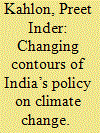

|
|
|
|
|
| Summary/Abstract |
Never before has environment, the most precious heritage of man and the mainstay of development activities been subjected to constant damage as humanity strives to achieve better living standards. The industrialized countries with their economic growth, which means higher greenhouse gas emissions, are obviously guilty of causing global warming. The consequent climate change is posing a significant threat not only to the developmental activities but also to public health. There is a grim prospect of the collapse of life styles in developing countries like India, incase immediate remedial measures are not put in place.
|
|
|
|
|
|
|
|
|
|
|
|
|
|
|
|
| 2 |
ID:
138131
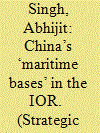

|
|
|
|
|
| Summary/Abstract |
After a successful visit by Prime Minister Narendra Modi to Colombo in March, Indian policy elite are hopeful that the new Sri Lankan government will roll-back some of the geopolitical concessions made by the Rajapaksa regime to Beijing, thereby restoring India’s primacy in its near neighbourhood. India’s policy elite are hopeful that Maithripala Sirisena, the new president, will roll back some of the geopolitical concessions made by his predecessor to Beijing, thereby restoring Indian primacy in its near neighbourhood.
New Delhi’s maritime analysts, however, remain a worried lot. Ever since a PLA-Navy (PLA-N) submarine docked twice in Colombo last year, Indian sea-power thinkers have been considering the prospect of a permanent Chinese naval presence in the Indian Ocean. Since November 2014, there have been strong rumours of a possible PLA-N base in the Indian Ocean Region (IOR). Media reports have indicated that Beijing was discussing a plan for multiple basing facilities in the Indian Ocean. An alarmed New Delhi even revived an old proposal for an Indian Ocean Zone of Peace—all in the hope that it would dissuade China from appropriating valuable space in its ‘strategic backyard’.
|
|
|
|
|
|
|
|
|
|
|
|
|
|
|
|
| 3 |
ID:
158120
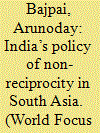

|
|
|
|
|
| Summary/Abstract |
The principle of Non-Reciprocity and greater focus on regional connectivity are the two important aspects of India’s contemporary South Asian Policy. Non-Reciprocity stands for a foreign policy posture in which a nation extends a helpful gesture to other nations without expectation of any reciprocal response from them. In South Asian context it means that India will do her best for the growth and prosperity of her neighbor without any reciprocal returns from them for the same.
|
|
|
|
|
|
|
|
|
|
|
|
|
|
|
|
| 4 |
ID:
184375
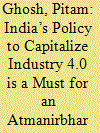

|
|
|
|
|
| Summary/Abstract |
The complete manufacturing ecosystem is undergoing a phenomenal shift with technological advancements happening at a fast pace. The need to understand and adopt the advanced manufacturing techniques is the need of hour.
|
|
|
|
|
|
|
|
|
|
|
|
|
|
|
|
| 5 |
ID:
166830
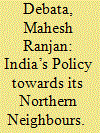

|
|
|
|
|
| Summary/Abstract |
The importance of India’s northern neighbourhood is ironically felt and redoubled in the post-Cold War period following the disintegration of erstwhile Soviet Union. In the northern neighbourhood, there is a potential enemy (Pakistan) with whom India has fought four wars in the last seven decades or so; there is a fierce competitor, economically and militarily superior (China) power that continues to pose serious challenges to India every here and there; there are resource-rich regions-cum-friendly nations such as Central Asia and Mongolia; and also there is a war-torn shattered security zone (Afghanistan). Amidst challenges and opportunities, India has been considering this region as key to maximize its national interests and international goals in this region, and thus trying to maintain a balance with a set of foreign policy measures.
|
|
|
|
|
|
|
|
|
|
|
|
|
|
|
|
| 6 |
ID:
148571
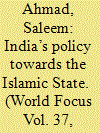

|
|
|
|
|
| Summary/Abstract |
The Islamic State of Iraq and Syria (ISIS) is a Sunni militant jihadist group predominantly active in Iraq and Syria. The group subscribes to an extreme version of Islam and promotes sectarian violence in keeping with its jihadist ideology. All non-Muslims and even Shi’as are denounced by the Islamic State as infidels and apostates. The main ambition of the jihadist group is to create a united, transnational pan-Islamic State, a Shari’a based caliphate, stretching mainly across Iraq and the Levant region.
|
|
|
|
|
|
|
|
|
|
|
|
|
|
|
|
| 7 |
ID:
185403
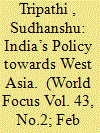

|
|
|
|
|
| Summary/Abstract |
As West Asia is an extended part of the Greater Asia and has many of the common and defining geographical connections, resulting into the closest economic, political, social, and cultural similarities between the two, the cultural roots as evolved since ancient times between India and West Asia, obviously point at the marked similarities between them. Because no other country in the Asian continent have had as long and sustained historical engagements with the West Asia - despite undergoing tumultuous and turbulent journey since the long past reflecting gory violence and brutal terrorism - as that of India and that underlines the significance of present day relevance between them. Evidently their mutual relations make their historic engagements unique and unparalleled.
|
|
|
|
|
|
|
|
|
|
|
|
|
|
|
|
| 8 |
ID:
156564
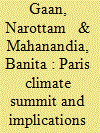

|
|
|
|
|
| Summary/Abstract |
The Paris Agreement on climate change signed and adopted in November 2015 marked a great divagation from the contents and purpose of the Kyoto protocol. What was achieved at Kyoto at least in terms of fixing the responsibility on the rich industrialized North countries for their polluting the atmosphere for the last three centuries was washed away at Paris.
|
|
|
|
|
|
|
|
|
|
|
|
|
|
|
|
| 9 |
ID:
162999
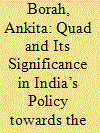

|
|
|
|
|
| Summary/Abstract |
India’s immediate neighbourhood is of major consequence in foreign policy framework. China and Pakistan are two neighbourhood countries from which India faces constant security challenges. In the recent times, China’s exponential rise in terms of its military might, assertiveness in the Indo-pacific region, economic growth and its increased connectivity with India’s neighbourhood has alerted not only India but many countries world over.
|
|
|
|
|
|
|
|
|
|
|
|
|
|
|
|